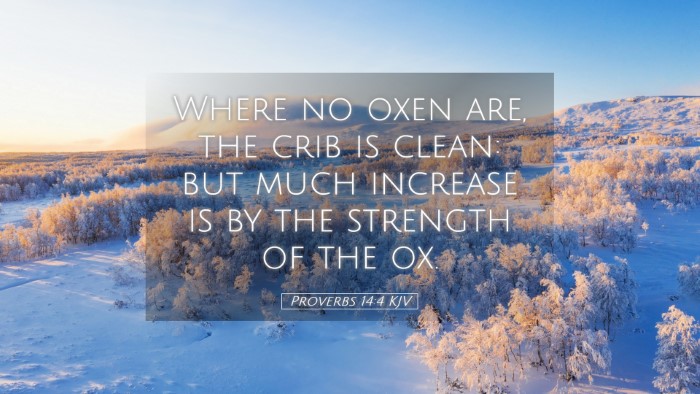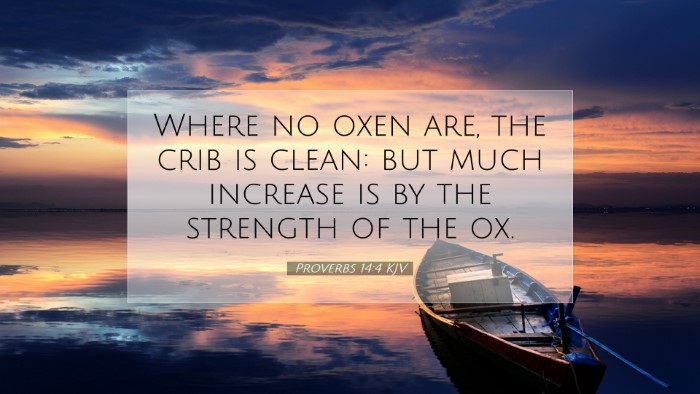Commentary on Proverbs 14:4
Verse: "Where no oxen are, the crib is clean: but much increase is by the strength of the ox."
Introduction
This proverb brings to light the practical considerations of life, reflecting on the balance between cleanliness and productivity. The phrase presents a metaphor that resounds with pastoral wisdom and serves as a reminder of the intricacies involved in achieving growth and success.
Exposition of the Verse
At first glance, the verse highlights a simple truth regarding agriculture and livestock. The absence of oxen leads to a clean environment, while the presence of oxen is associated with labor and productivity, albeit at the cost of some messiness.
- Cleanliness vs. Productivity: The imagery of a clean crib is inviting, but it comes at the cost of not having oxen to plow the fields. This contrast serves to remind us that productivity may involve certain inconveniences.
- Value of Labor: The strength of the ox signifies the necessity of hard work and effort to achieve abundance. This notion forms the bedrock of fruitful living, emphasizing diligence and investment in one’s responsibilities.
Insights from Matthew Henry
Matthew Henry articulates that the “crib” symbolizes a place of provision and comfort. He observes that in pursuit of wealth and success, one must often endure the chaos and challenges that come with employing resources effectively.
He further suggests that while avoiding difficulties might lead to a superficially pristine situation, it also invites stagnation, as effort and involvement naturally bring some disorder into life.
Thoughts from Albert Barnes
Albert Barnes emphasizes the practical wisdom encapsulated in this proverb. He notes that the absence of oxen—or, metaphorically, the lack of effort in any endeavor—yields no results. Cleanliness, in this context, is not merely about physical space but extends to emotional and spiritual domains, where the pursuit of purity often overshadows the essential work that needs to be undertaken.
Barnes highlights that true increase, whether materially or spiritually, comes from engaging with the work at hand, accepting the messiness of life as part of the growth process.
Reflections from Adam Clarke
Adam Clarke interprets this verse within its agrarian context, noting that oxen are indispensable for agricultural labor. He acknowledges the cleaner approach of avoiding the responsibilities of farming; however, he insists that such avoidance leads to stagnation. Clarke discusses the sacrifices required when engaging actively in labor.
Additionally, he touches on the spiritual layers of the proverb, implying that without willing investment in one’s spiritual life, growth in grace and knowledge of God is hampered. Clarke’s insights underlie the principle that living a life of purpose requires sacrifices, actively engaging in the messiness of relationships and responsibilities.
Practical Applications
The wisdom embodied in Proverbs 14:4 has vast implications across various domains of life:
- In Ministry: Ministry often demands significant effort and may lead to complexities within the congregation. Leaders should embrace the challenges as they serve, recognizing that spiritual growth often comes with trials.
- In Personal Life: Individuals are encouraged to engage with the messy realities of family life, community interactions, and personal relationships. Growth requires investment, acknowledging that clean—and simple—paths may lead to stagnation.
- In Education: Students and scholars should adopt an approach that appreciates rigorous study and accepts that the pursuit of knowledge may create friction in the learning process. Embracing challenges leads to deeper understanding.
Conclusion
The essence of Proverbs 14:4 lies in the juxtaposition of cleanliness and productivity. This verse serves as a poignant reminder to pastors, students, theologians, and scholars: true growth requires engagement with the world, accepting its inherent messiness as a part of the journey toward greater fruitfulness. Whether it is in ministry, personal development, or academic pursuits, the labor invested yields a richer harvest. Therefore, one must not shy away from the work, the slight disorder, and the activities that foster growth.


